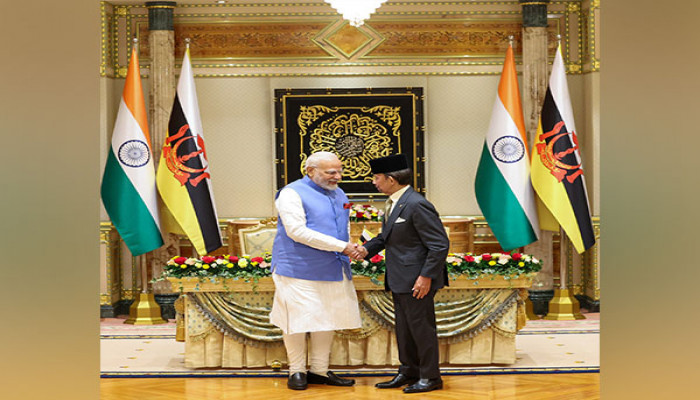Modi’s Historic Visit to Brunei Opens New Vistas to Revitalise Act East Policy
- In Foreign Policy
- 11:51 PM, Sep 05, 2024
- Ramaharitha Pusarla
Marking a decade of the Act East Policy, the Modi government is significantly enhancing relations with Southeast Asia and the broader Indo-Pacific region. After the back-to-back visits by the leaders of Vietnam and Malaysia, reinvigorating ties with the ASEAN (Association of South East Asian Nations) region, PM Modi has embarked on a two-nation visit on September 3rd.
PM Modi’s sojourn comes at the back of the recent string of high-level visits to the region- EAM Jaishankar's participation at the ASEAN Foreign Ministers meeting in Laos in July and President Droupadi Murmu’s State visit to Timor Leste, Fiji and New Zealand. In a first-ever visit by an Indian Prime Minister to Brunei, PM Narendra Modi arrived in Bandar Seri Begawan on his first leg of the tour at the invitation of Sultan Haji Hassanal Bolkiah.
Warmly received by Crown Prince Haji Al-Muhtadee Billah and senior minister in Prime Minister’s office at the airport, PM Modi held bilateral talks with his Brunei counterpart. The role of Prime Minister is donned by the Sultan who ascended the throne in 1967. Hosted by the Sultan at the grand Istana Nurul Iman, the world’s largest palace, leaders have elevated ties to ‘enhanced partnership’1. Sides have agreed to deepen cooperation in different areas of mutual interest like trade and investment, energy, renewable, Information and Communication Technology, health, pharmaceuticals, capacity building and education, tourism, and sharing best practices in agriculture. To foster people to people connection and tourism, a direct flight between Chennai and Bandar Seri Begawan was announced.
The two major pillars of India-Brunei bilateral relations are Defence and Space Cooperation. Countries signed an MoU on defence in 2016 catering to high-level exchanges, joint training exercises and participation in each other’s defence expos. After its renewal in 2021, port calls became a regular feature.
Being close to the equator and disposed towards the East, Brunei’s strategic geographic position makes it a perfect place for satellite launches. In 1997 India signed an agreement for setting up ISRO’s Telemetry, Tracking and Telecommand Centre in Brunei. The centre was ready by 2000. Over 35 ISRO missions have been completed successfully with the data collected from this station2. India signed a MoU in 2018. During his current visit, PM Modi renewed the MoU further enhancing cooperation in space research, science and applications3.
With India gearing up for the crucial Gaganyaan mission, India is aggressively advancing space diplomacy considering the critical importance of real-time support and tracking activities of the orbiting Vyomanauts.
As a part of this MoU, India has offered to train officers, and scientists of Brunei in space and satellite technology applications. Given its ambient location of lying in the eastern hemisphere close to the equator, satellite launches from Brunei will consume less fuel making them cost-effective. Due to its strategic location, Brunei is courted by Japan, China and the US. Besides Brunei, India has telemetry stations in Mauritius, Biak in Indonesia, Sao Tome and Principe and Vietnam.
Located on Borneo Island, with territorial claims to the South China Sea, Brunei largely maintains a non-controversial foreign policy and has warm relations with both the US and China. Aligned with the ASEAN, Brunei has the closest relations with Singapore and maintains cordial ties with both Malaysia and Indonesia. It has special ties with the UK for its security role in stationing the 2000-strong British Gorkha Reserve Unit in Brunei4.
With five lakh population and the second highest per capita after Singapore, Brunei is the smallest ASEAN country (in terms of population). Brunei has an executive monarchy with an illustrious history of continuing monarchies from the 14th century. As a protectorate of the British, Brunei obtained independence in 1984. The Sharia-compliant nation with special laws for Muslims has minorities like Christians, Buddhists and a few Hindus who make up 23% of the population.
India and Brunei with millennium-long cultural and trade ties established diplomatic ties in 1984. PM Modi’s visit coincides with 40 years of establishment of bilateral partnership. Brunei is an important partner in India’s Act East Policy and Indo-Pacific vision. Despite its size, Brunei is important for India’s strategic interests. Brunei has huge oil reserves and India has invested $270 million in its energy sector. India is the third-largest importer of Bruneian Oil. With immense potential for expanded cooperation, a State visit of the Indian Prime Minister to Brunei was long overdue.
Both countries committed to the maintenance of peace, stability, prosperity, security and resilience in the region have underscored respect for freedom of navigation and overflight, unimpeded lawful commerce and peaceful resolution of disputes in accordance with the UN Convention on the Law of the Sea (UNCLOS), 1982.
Reiterating India’s position in an indirect dig at China, Modi said, “We support the policy of development, not expansionism…. Through International laws like UNCLOS, we support freedom of navigation and overflight. We agree that there should be a consensus on the code of conduct in the region”.
PM Modi inaugurated new chancery premises at the High Commission of India and visited Omar Ali Saifuddien Mosque. Greeted by the Indian community, which is approximately 14,500, their contributions as doctors, professionals, and teachers are well acknowledged in the country. Besides revitalising the ties, PM Modi’s visit has energised India’s Act East Policy which took a backseat due to geopolitical turbulences.
ASEAN is central to the Indo-Pacific vision and by extension maritime security of the region. Emphasising the need for leveraging strengths in manufacturing, technology and processing, both countries acknowledged the importance of regular exchanges including through Joint Trade Committees (JTC). As opposed to international recognition of India as a rising power, analysis of the State of South East Asia Survey published by the ASEAN Studies Centre indicates that India’s influence in the ASEAN region is underwhelming.
Among the major partners, China is the most influential in ASEAN followed by US and Japan. These are closely followed by the EU, South Korea, the UK, Australia, and the Russian Federation. India is among the list of partners with the least strategic relevance along with Canada and New Zealand. India is 8th in the list of 11 ASEAN partners5. While India is seen as a responsible stakeholder in terms of championing international law, ASEAN countries largely believe India doesn’t have the political will or capacity for global leadership. This stems from the notion that India is largely distracted with its internal and sub-continental affairs and hence can’t focus on global concerns or issues.
Though India enjoys goodwill, and commands respect as a civilisational state with strong cultural and historical relations with the countries in the region, it has largely failed to project its power. India must intensify its engagement with the region which offers ample opportunities for trade, investment, defence cooperation and maritime security. Modi’s visit is a significant move in terms of cementing ties with the region which lies in its extended neighbourhood.
References
- https://www.mea.gov.in/bilateral-documents.htm?dtl/38254/Joint_Statement_on_an_Enhanced_Partnership_between_the_Republic_of_India_and_Brunei_Darussalam
- https://www.mea.gov.in/Portal/ForeignRelation/Bilateral_Brief_-_for_website_November_2022_-_2_November_2022.pdf
- https://spacewatch.global/2018/09/sultanate-of-brunei-to-host-indian-satellite-tracking-and-telemetry-station/
- https://www.gatewayhouse.in/brunei-aseans-player/
- https://www.iseas.edu.sg/wp-content/uploads/2024/03/The-State-of-SEA-2024.pdf
Image source: ANI
Disclaimer: The opinions expressed within this article are the personal opinions of the author. MyIndMakers is not responsible for the accuracy, completeness, suitability, or validity of any information on this article. All information is provided on an as-is basis. The information, facts or opinions appearing in the article do not reflect the views of MyindMakers and it does not assume any responsibility or liability for the same.







Comments